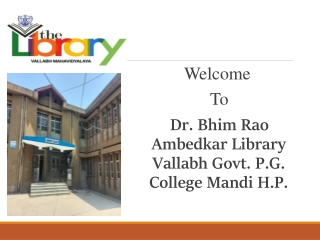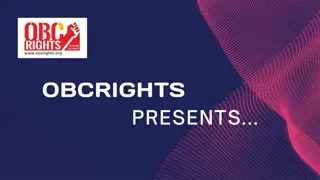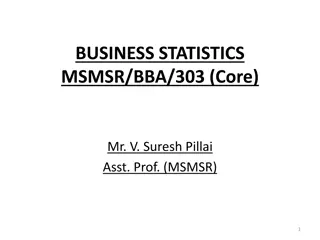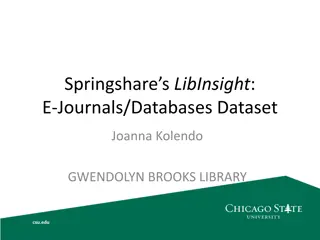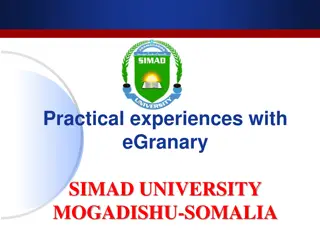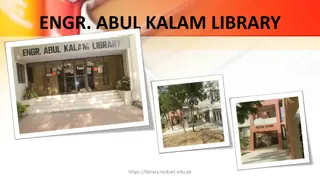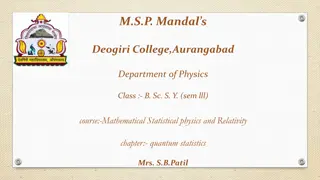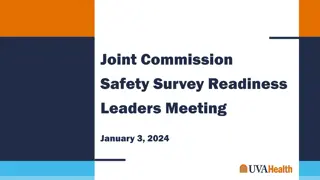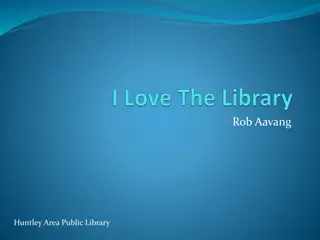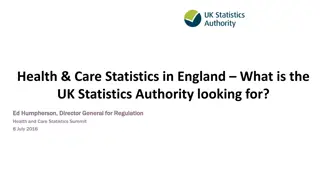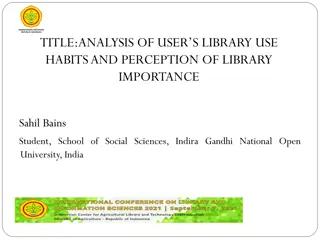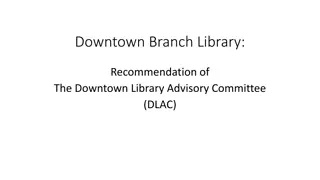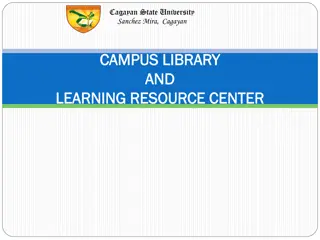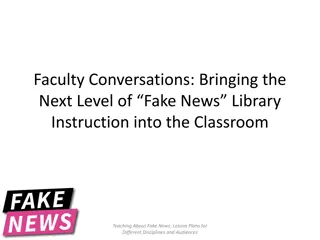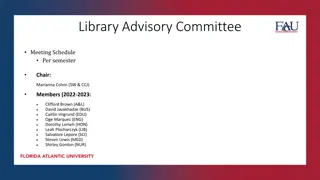Overview of the ACRL Academic Library Trends and Statistics Survey
The ACRL Academic Library Trends and Statistics Survey is the largest of its kind in the U.S., facilitating benchmarking, trend tracking, and showcasing the value of academic libraries. With over 1,600 participating libraries, the survey captures data on various aspects including response rates, survey changes, pandemic-related questions, and mapping to ACRL standards. Library personnel collaborate with faculty for student-centered curricular experiences.
Download Presentation

Please find below an Image/Link to download the presentation.
The content on the website is provided AS IS for your information and personal use only. It may not be sold, licensed, or shared on other websites without obtaining consent from the author. Download presentation by click this link. If you encounter any issues during the download, it is possible that the publisher has removed the file from their server.
E N D
Presentation Transcript
The ACRL Academic Library Trends and Statistics Survey Janine A. Kuntz, Wheaton College Massachusetts Jeannette E. Pierce, University of Missouri-Columbia Devin Savage, Illinois Institute of Technology
What is the ACRL Survey? Administered by the ACRL Academic Library Trends and Statistics Survey Editorial Board Largest survey of academic libraries in the U.S. Facilitates effective benchmarking, assessment of impact over time, tracking of new trends, and demonstration of academic libraries value
Who Participates? Designed to gather information from all types of academic libraries, including their archives and special collections Composed of four parts
2020 Response Rates 1,672 participating libraries Response rate: 49.8%
2020 Survey Changes New IPEDS definitions for the questions about collections New questions about asynchronous presentations Pandemic questions about libraries' closings and limited occupancy New survey about facilities
Mapping to the ACRL Standards Institutional Effectiveness Space Collections External Relations Discovery Educational Role Professional Values Administration Personnel
Library personnel collaborate with faculty and others regarding ways to incorporate library collections and services into effective curricular and co- curricular experiences for students. Educational Role Performance Indicator 3.1
The library provides one- on-one assistance through multiple platforms to help users find information. Discovery Performance Indicator 4.6
The library builds and ensures access to unique materials, including digital collections. Collections Performance Indicator 5.3
Items and Usage in Digital Repositories across All Libraries
The library partners with multiple institutions (e.g., via collections consortia) to increase cost- effectiveness and to expand access to collections. Management/ Adminstration/ Leadership Performance Indicator 7.5
Library personnel are sufficient in quantity to meet the diverse teaching and research needs of faculty and students. Personnel Performance Indicator 8.1
Student Full Time FTE to Total # of Staff FTE 2016 2017 2018 2019 2020 148:1 141:1 147:1 153:1 162:1 Doctoral 187:1 190:1 194:1 211:1 208:1 Master's 125:1 129:1 131:1 137:1 148:1 Baccalaureate 385:1 377:1 284:1 394:1 392:1 Associate's
Recent Trends Topics 2020 - Equity, Diversity, and Inclusion (EDI) 2019 - Open Educational Resources (OER) 2018 - Library Contributions to Student Success Initiatives 2017 - Faculty Rank, Status, and Tenure for Librarians 2016 - Staffing & Services 2015 - Collections
Benchmarking Example Choose Period, Name, Description, Locations, and Indicators Indicators are data entered (expenditures, holdings, services, etc.) Locations are the individual institutions that you can compare your results against - but not all institutions submit
Benchmarking Example IIT vs AITU Salary +3.7% Materials -13.3% Presentations +15.9% Gate Count* +15.7%
Correcting 2020/historical data Yes, it s possible! acrlbenchmark@ala.org
What we do? 1. Review/refine questions and guidance 2. Create and define Trends questions 3. Identify non-respondents and reach out to encourage greater participation 4. Liaise with appropriate groups 5. Provide rapid-response assistance
Recent Common Questions A. Virtual reference (67) = online reference transactions + online Research Consultations whereas Reference transactions (64) = in- person + online transactions (but not consultations!) B. For eJournal usage, use Unique Item Requests and for ebooks use Total Item requests C. We will continue to ask this question, please try to capture the work put forth by the library A. Virtual Reference (#67) vs Reference Transactions (#64) B. Electronic Usage/Circulation (#60-#63) C. Asynchronous Presentations (#72)
acrlbenchmark@ala.org Janine A Kuntz kuntz_janine@wheatoncollege.edu Contact Us Jeannette Pierce, Vice-Chair piercejea@missouri.edu Devin Savage, Chair dsavage@iit.edu
. More Information ACRL Benchmark: https://librarybenchmark.org/ Survey Information: https://acrl.libguides.com/stats/surveyhelp Kuntz, Janine A.; Pierce, Jeannette E.. The 2019 ACRL Academic Library Trends and Statistics Annual Survey: Mapping results to the ACRL Standards for Libraries in Higher Education.College & Research Libraries News, [S.l.], v. 82, n. 2, p. 87, feb. 2021. ISSN 2150-6698. Available at: <https://crln.acrl.org/index.php/crlnews/article/view/24814/32643>. Date accessed: 14 june 2021. doi:https://doi.org/10.5860/crln.82.2.87. Creative Commons LicenseThis work is licensed under a Creative Commons Attribution 4.0 International License


